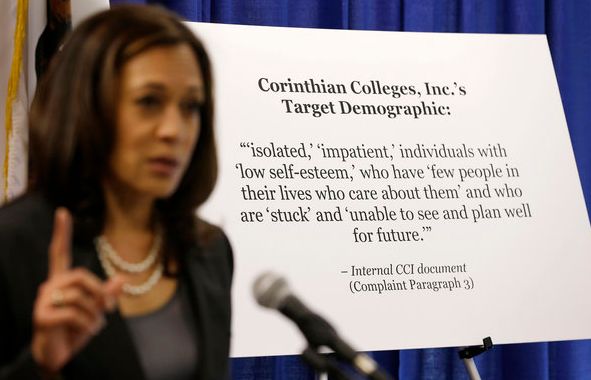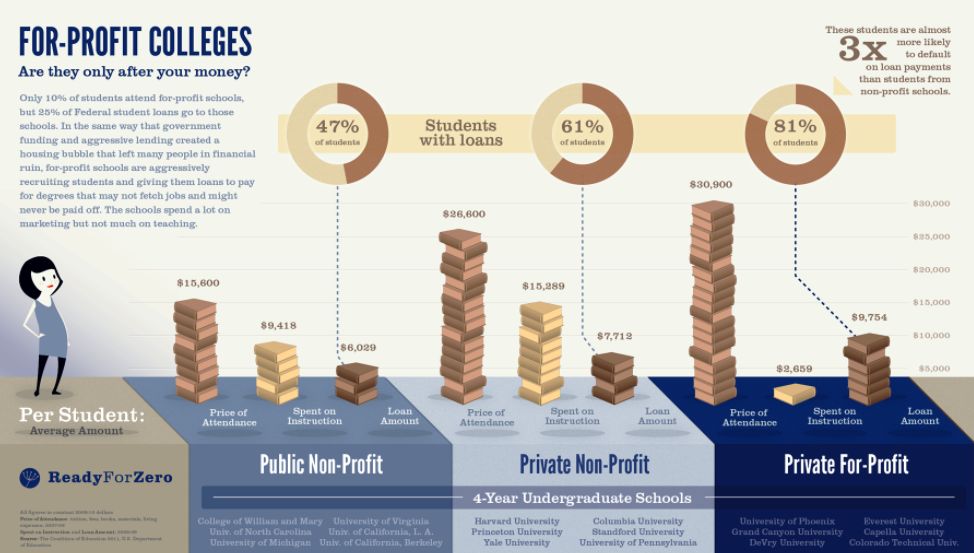Founded in February, 1995, and defunct, April, 27, 2015 in both the U.S. and Canada, Corinthian Colleges, Inc. (CCi) was a large for-profit post-secondary education company in North America. Its subsidiaries offered career-oriented diploma and degree programs in health care, business, criminal justice, transportation technology and maintenance, construction trades, and information technology.
The Los Angeles Times framed Corinthian Colleges as a collection of "castoff" schools that were taken over by Wall Street investors in 1999. Those investors, David Moore, Paul St. Pierre, Frank McCord, Dennis Devereux, and Lloyd Holland were executives at National Education Centers, Inc. (NECI), a for-profit operator of vocational schools based in Irvine, California. The founders planned to acquire schools that were fundamentally sound, but which for one reason or another were performing below their potential.
At its largest, CCi had over 100 Everest, Heald and WyoTech campuses throughout the United States and Canada. Corinthian's campuses in Canada closed on February 19, 2015 after the Ontario government suspended their operation license. After a series of legal challenges by state and federal agencies, on April 26, 2015 Corinthian Colleges announced that they would cease operations at all remaining US locations effective April 27, 2015. The closure affected more than 16,000 students and employees.
On May 4, 2015, Corinthian Colleges, Inc. and twenty four of its subsidiaries filed a chapter 11 bankruptcy in the United States Bankruptcy Court for the District of Delaware.
The Los Angeles Times framed Corinthian Colleges as a collection of "castoff" schools that were taken over by Wall Street investors in 1999. Those investors, David Moore, Paul St. Pierre, Frank McCord, Dennis Devereux, and Lloyd Holland were executives at National Education Centers, Inc. (NECI), a for-profit operator of vocational schools based in Irvine, California. The founders planned to acquire schools that were fundamentally sound, but which for one reason or another were performing below their potential.
At its largest, CCi had over 100 Everest, Heald and WyoTech campuses throughout the United States and Canada. Corinthian's campuses in Canada closed on February 19, 2015 after the Ontario government suspended their operation license. After a series of legal challenges by state and federal agencies, on April 26, 2015 Corinthian Colleges announced that they would cease operations at all remaining US locations effective April 27, 2015. The closure affected more than 16,000 students and employees.
On May 4, 2015, Corinthian Colleges, Inc. and twenty four of its subsidiaries filed a chapter 11 bankruptcy in the United States Bankruptcy Court for the District of Delaware.
Your browser does not support viewing this document. Click here to download the document.
Education Dept. Fires Law Firm Investigating Fraud-Plagued Corinthian Colleges Collapse
By Jeff Horwitz, Associated Press
WASHINGTON (AP) — The Education Department is removing a law firm hired to oversee the turnaround of schools owned by Corinthian Colleges Inc., a for-profit education company whose financial collapse had placed at risk more than $1 billion in federal student loans.
An Associated Press investigation identified conflicts with the ostensibly independent monitor.
The department said it was removing the firm, Hogan Marren Babbo & Rose Ltd. of Chicago, after the AP reviewed with senior agency officials its findings last week after a nine-month investigation examining the Obama administration's response to Corinthian's extraordinary collapse in 2014 amid allegations of mismanagement and fraud. The department had previously said only that it intended to review the firm's performance going forward.
The chairman of the firm's education practice, Charles P. Rose, declined Monday to discuss his firm's removal.
The monitor has been overseeing the business practices of Zenith Education Group, an offshoot of a student-loan debt collection firm that took over Corinthian's operations. It was serving as the U.S. government's close-up eyes and ears, reviewing Zenith's marketing materials and admissions phone calls and the accuracy of graduation and employment statistics.
"I've notified Zenith and Hogan Marren that we do not intend to approve renewal of Hogan Marren as the independent monitor," Education Undersecretary Ted Mitchell told the AP. "We believe we need a monitor with different capacities to serve in this next phase of Zenith's development."
The AP's investigation found that the way the monitor had been hired created an attorney-client privilege relationship that shielded its work from outside scrutiny and obligated it to act in Zenith's interest. The firm had been hired directly by Zenith as legal counsel. That distinction created the attorney-client privileged relationship.
After the AP questioned the arrangement, the Education Department last fall altered the terms of its monitoring arrangement. Contract addendums expressly warned that Zenith was not permitted to edit Hogan Marren's compliance reports before they were presented to the department. Nor could the firm solicit additional work from Zenith during its monitoring. The changes also allowed the government to request copies of the firm's underlying work product.
The AP found that the firm also had advocated on behalf of for-profit colleges, helped broker the purchase of Corinthian's assets and argued in a legal brief that for-profit schools had a free speech right not to inform prospective students about poor graduate employment outcomes. MORE
WASHINGTON (AP) — The Education Department is removing a law firm hired to oversee the turnaround of schools owned by Corinthian Colleges Inc., a for-profit education company whose financial collapse had placed at risk more than $1 billion in federal student loans.
An Associated Press investigation identified conflicts with the ostensibly independent monitor.
The department said it was removing the firm, Hogan Marren Babbo & Rose Ltd. of Chicago, after the AP reviewed with senior agency officials its findings last week after a nine-month investigation examining the Obama administration's response to Corinthian's extraordinary collapse in 2014 amid allegations of mismanagement and fraud. The department had previously said only that it intended to review the firm's performance going forward.
The chairman of the firm's education practice, Charles P. Rose, declined Monday to discuss his firm's removal.
The monitor has been overseeing the business practices of Zenith Education Group, an offshoot of a student-loan debt collection firm that took over Corinthian's operations. It was serving as the U.S. government's close-up eyes and ears, reviewing Zenith's marketing materials and admissions phone calls and the accuracy of graduation and employment statistics.
"I've notified Zenith and Hogan Marren that we do not intend to approve renewal of Hogan Marren as the independent monitor," Education Undersecretary Ted Mitchell told the AP. "We believe we need a monitor with different capacities to serve in this next phase of Zenith's development."
The AP's investigation found that the way the monitor had been hired created an attorney-client privilege relationship that shielded its work from outside scrutiny and obligated it to act in Zenith's interest. The firm had been hired directly by Zenith as legal counsel. That distinction created the attorney-client privileged relationship.
After the AP questioned the arrangement, the Education Department last fall altered the terms of its monitoring arrangement. Contract addendums expressly warned that Zenith was not permitted to edit Hogan Marren's compliance reports before they were presented to the department. Nor could the firm solicit additional work from Zenith during its monitoring. The changes also allowed the government to request copies of the firm's underlying work product.
The AP found that the firm also had advocated on behalf of for-profit colleges, helped broker the purchase of Corinthian's assets and argued in a legal brief that for-profit schools had a free speech right not to inform prospective students about poor graduate employment outcomes. MORE
Your browser does not support viewing this document. Click here to download the document.
Your browser does not support viewing this document. Click here to download the document.


